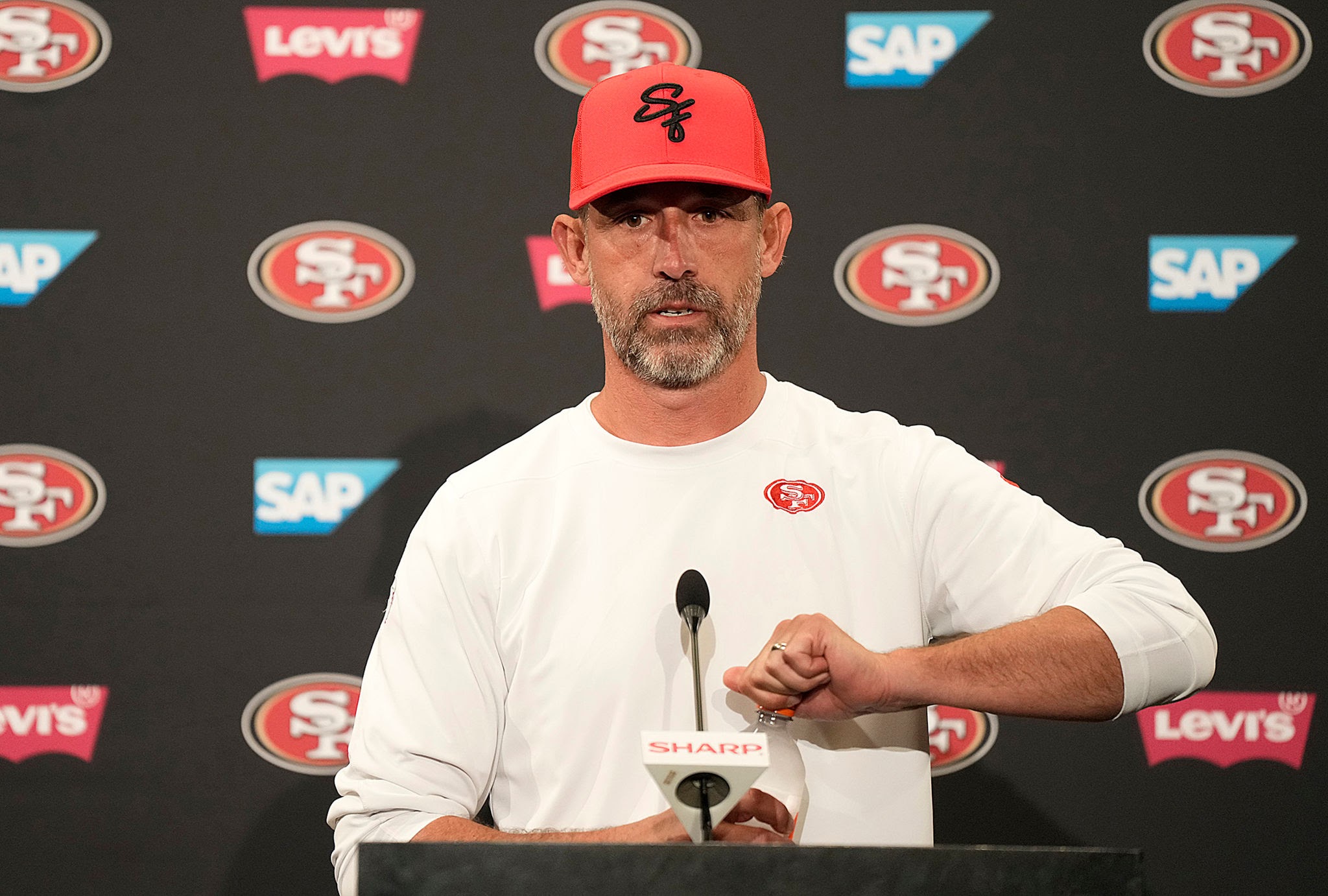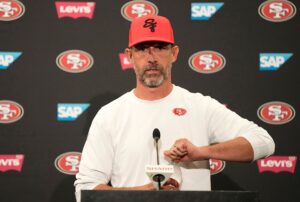
The sun was setting over the sprawling cityscape of San Francisco, casting a golden glow over Levi’s Stadium. Inside the stadium, the atmosphere was charged with anticipation as the San Francisco 49ers prepared for the upcoming season. The focus was not only on the starting lineup but also on the crucial role of the backup quarterback. The question on everyone’s mind was: Do the 49ers have a good backup quarterback?

This season, Shanahan was determined to ensure the 49ers were well-prepared. The team had brought in a promising young quarterback, Jake Harris, to compete for the backup position. Harris was a third-round draft pick from a small but competitive college program. He had shown flashes of brilliance during his college career, leading his team to several come-from-behind victories and displaying a cool demeanor under pressure.
As training camp began, all eyes were on Harris. He faced stiff competition from the more experienced veteran, Mike Simmons, who had been with the team for three years. Simmons was known for his steady hand and deep knowledge of the playbook, but his physical abilities had started to decline with age. The coaching staff was keen to see if Harris could demonstrate the consistency and leadership needed for the backup role.
The first few weeks of training camp were intense. Harris impressed the coaches with his arm strength and accuracy. He threw tight spirals and made quick decisions, earning the respect of his teammates. However, there were moments when his inexperience showed. He occasionally held onto the ball too long, resulting in unnecessary sacks, and his reads were not always accurate.
One afternoon, during a particularly grueling practice, Harris had a breakthrough moment. The team was running a two-minute drill, simulating a high-pressure game scenario. The defense was relentless, and the clock was ticking. Harris took the snap, scanned the field, and found his wide receiver, Marcus Allen, cutting across the middle. Harris released the ball with perfect timing, and Allen caught it in stride, racing down the field for a touchdown. The sideline erupted in cheers, and Shanahan couldn’t help but smile. It was a glimpse of Harris’s potential, a sign that he could rise to the occasion when it mattered most.
Despite the progress, Shanahan knew that one practice was not enough to make a final decision. The preseason games would be the true test. The 49ers’ first preseason game was against the Kansas City Chiefs, a team known for its aggressive defense. Harris was slated to play the second half, giving him ample opportunity to showcase his skills.
The game started with the 49ers’ starting quarterback, Sam Reynolds, leading the team efficiently. By halftime, the 49ers were trailing by a slim margin. As the second half began, Harris took the field. The stadium buzzed with excitement and a hint of nervousness.
Harris’s first series was shaky. He overthrew his receiver on the first play and was sacked on the second. The pressure was mounting, and the Chiefs’ defense was relentless. But Harris did not waver. He regrouped, took a deep breath, and went back out for the next series.
This time, he was more composed. He executed a series of quick passes, moving the chains and gaining confidence. On third down and long, he stepped up in the pocket, evaded a blitzing linebacker, and fired a pass to his tight end, Jack Mitchell, who made a leaping catch for a first down. The drive culminated in a beautifully thrown touchdown pass to Allen, who had once again found a seam in the defense.
Harris continued to play with poise, leading another scoring drive and demonstrating his ability to manage the game. By the end of the game, the 49ers had secured a comeback victory, and Harris had thrown for over 200 yards and two touchdowns. The coaching staff was impressed, and Shanahan felt a sense of relief. Harris had shown that he could handle the pressure and perform at a high level.
Over the next few preseason games, Harris continued to improve. He developed better chemistry with his receivers and made smarter decisions. The competition with Simmons pushed him to be better, and the veteran’s mentorship helped him refine his skills. By the end of the preseason, it was clear that Harris had earned the backup quarterback position.
As the regular season approached, the team’s confidence in Harris grew. His performance in the preseason had answered many questions, but the true test would come in the regular season. The 49ers’ schedule was tough, and the team knew that injuries were an unfortunate reality of the game. Harris had to be ready to step in at any moment.
The moment came sooner than expected. In the third game of the season, Reynolds took a hard hit and had to leave the game with a shoulder injury. The stadium fell silent as Harris jogged onto the field. This was his chance to prove himself on the biggest stage.
The 49ers were trailing by a touchdown with ten minutes left in the fourth quarter. Harris took the snap and executed the plays with precision. He showed remarkable composure, moving the ball down the field with a mix of short passes and strategic runs. With two minutes left, the 49ers were in the red zone.
Harris stood in the shotgun formation, scanning the defense. He took the snap, dropped back, and saw Allen break free in the corner of the end zone. Harris delivered a perfect pass, and Allen made the catch, tying the game. The stadium erupted in applause, but Harris knew the job wasn’t finished. The defense held strong, forcing a punt, and Harris got the ball back with less than a minute to go.
With the game on the line, Harris showcased his clutch gene. He connected with Mitchell on a crucial third down, and then with Allen on a deep route that put the team in field goal range. As the clock ticked down, the 49ers’ kicker nailed the game-winning field goal, sealing a dramatic victory.
The locker room was jubilant, and Harris was the hero of the night. Shanahan and the coaching staff were elated. They had found their answer: the 49ers did have a good backup quarterback. Harris had proven his worth, showing that he could step up when the team needed him the most.
As the season progressed, Harris continued to excel whenever called upon. His performances provided a safety net for the team, allowing them to navigate the ups and downs of a grueling NFL season with confidence. The 49ers made it to the playoffs, and while Reynolds eventually returned as the starter, Harris’s contributions were invaluable.
In the end, the story of Jake Harris was one of perseverance, growth, and redemption. He had gone from an unproven rookie to a reliable backup, earning the respect and trust of his teammates and coaches. The 49ers’ future looked bright, and Harris’s journey was a testament to the importance of having a good backup quarterback, ready to seize the moment and lead the team to victory when it mattered most.
Leave a Reply